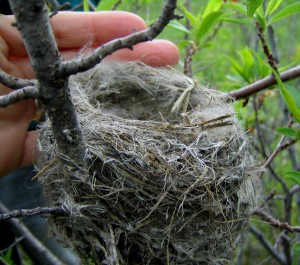Near the end of our birding-by-ear hike this morning, Eric, the ornithologist from Open Space and Mountain Parks, stepped over to a small tree beside the trail and asked, “Does anyone know who this belongs to?” It was a small nest at chest height left over from last year, built so solidly that it showed little wear from the weathering of wind, rain, and snow.
He gave us a clue. “It’s a bird that’s not back yet. They don’t build their nests until the trees have fully leafed out and there’s a little more cover. So they won’t be building for another few weeks.”
Even with the clues, none of us could guess. Turns out, it belonged to lazuli buntings (Passerina amoena), the males of which show electric blue backs and heads, white wing bars, and rusty collars above buffy breasts.
“How do you know it’s from lazuli buntings?” we asked. Eric got a funny look on his face. “Because they always nest right about this height.”
 I reached toward the nest. It was solid and heavy, lashed firmly to the branching twigs of the tree. I felt the inside–smooth and round, shaped to cup the tiny young. The inside of the nest was warm, even though the day was overcast and there had not yet been any sun. I would guess the inside was between five and ten degrees warmer than the surrounding air.
I reached toward the nest. It was solid and heavy, lashed firmly to the branching twigs of the tree. I felt the inside–smooth and round, shaped to cup the tiny young. The inside of the nest was warm, even though the day was overcast and there had not yet been any sun. I would guess the inside was between five and ten degrees warmer than the surrounding air.
A sweet crib for last year’s young.
Wonderful find and pics of the nest. Having a guide must add so much to birding.
I read that post and thought “vireo.” But I’ll take the expert’s word.
Certainly could have been vireo. There were a lot of warbling vireos in the area, and I even got a clear sight of one on the hike.
How great to discover you and your take on life! Thanks for finding my blog and making the connection. BTW, I’d say your guide is right about the lazuli bunting nest. In my experience, vireos don’t nest at chest-height, but buntings (and goldfinches) do.
Aren’t we fortunate to live in such a wonderfully diverse world? If we can learn to live generously and lightly, we can keep it that way….